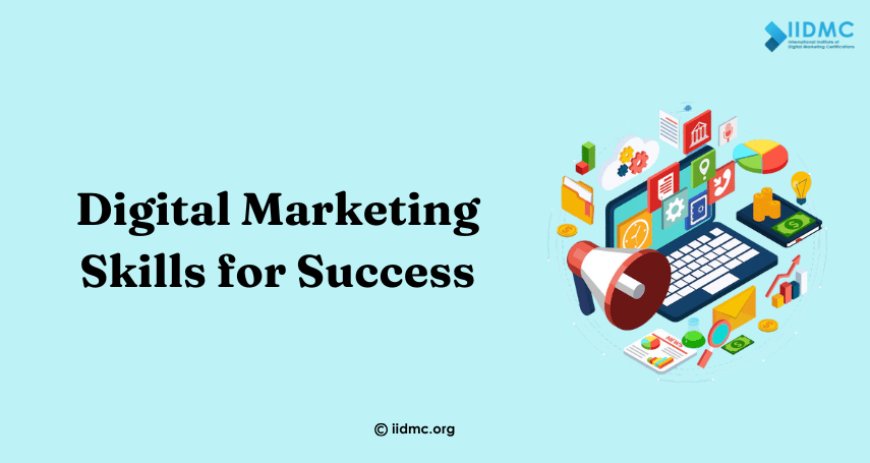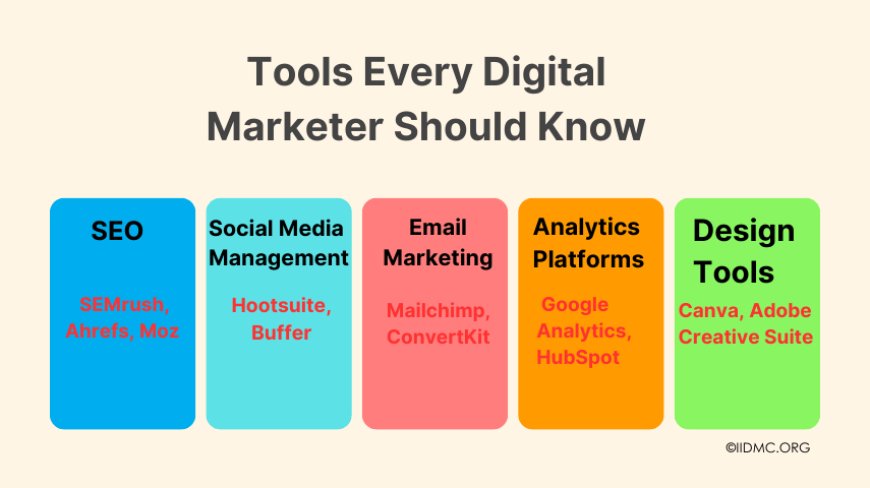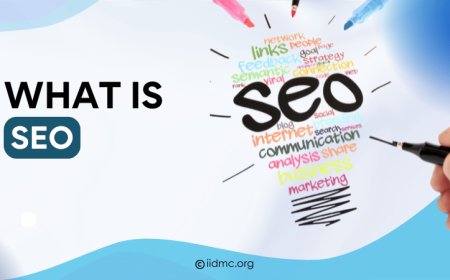Digital Marketing Skills for Success
Discover essential digital marketing skills for success, including SEO, social media, content creation, analytics, and more. Boost your career in the digital age today.

Digital marketing has become a powerful way for businesses to connect with their audience and achieve their goals. Whether it’s creating engaging content, running social media campaigns, or analyzing data to improve strategies, having the right skills can make a big difference in this field. For anyone looking to start or grow a career in digital marketing, understanding the essential skills is key to staying competitive and achieving success.In this blog, we’ll explore the skills that can help you succeed as a digital marketer, from mastering tools like SEO and analytics to developing creativity and effective communication. Whether you’re a beginner or someone looking to sharpen your abilities, this guide will help you understand what it takes to thrive in the ever-evolving world of digital marketing.
Key Digital Marketing Skills You Need for Success
To succeed in digital marketing, you need a mix of creative, analytical, and technical skills. These abilities help you create impactful campaigns, connect with your audience, and drive results. Here’s a breakdown of the essential skills every aspiring digital marketer should focus on:
-
Search Engine Optimization (SEO)
SEO is about making your website or content easier for search engines to find and rank. By understanding how search engines work and using the right keywords, you can attract more visitors to your site organically. -
Pay-Per-Click Advertising (PPC)
PPC involves creating paid ad campaigns on platforms like Google Ads or Facebook. Knowing how to target the right audience, write compelling ad copy, and manage budgets is crucial for running successful campaigns. -
Content Marketing
Content marketing focuses on creating valuable and engaging content, such as blogs, videos, or infographics. It’s all about understanding your audience’s needs and providing information or entertainment that builds trust and interest. -
Social Media Marketing
Social platforms like Instagram, LinkedIn, and Twitter are key for reaching and interacting with your audience. Social media marketing skills help you craft posts, run campaigns, and foster meaningful engagement with followers. -
Email Marketing
Email marketing remains one of the most effective ways to connect with your audience. Skills in designing newsletters, writing personalized messages, and automating campaigns can help turn leads into loyal customers. -
Analytics and Data Interpretation
Digital marketers need to measure how well their strategies are working. Learning to use tools like Google Analytics helps you track website traffic, conversions, and overall performance, enabling you to make data-driven decisions. -
Basic Design and Copywriting Skills
Eye-catching visuals and persuasive messaging are important for grabbing attention and keeping your audience interested. Knowing basic graphic design and copywriting allows you to create content that looks professional and communicates effectively.
Soft Skills Essential for Digital Marketing Success
Success in digital marketing isn’t just about technical skills soft skills play a crucial role too. Here are the key ones you need:
-
Creativity: Think outside the box to design unique and engaging campaigns.
-
Adaptability: Stay flexible and ready to adjust to new trends and tools.
-
Communication: Collaborate effectively with teams and present ideas clearly.
-
Problem-Solving: Analyze challenges and develop smart, practical solutions.
Why Digital Marketing Skills Are in Demand
Digital marketing skills have become increasingly important as businesses rely more on online channels to connect with their audiences. Here’s why these skills are so sought after:
-
Growing Number of Businesses Going Digital
More businesses are moving online to reach customers where they spend their time. This shift has created a high demand for professionals who can manage websites, social media, and other digital platforms effectively. -
High Return on Investment (ROI)
Digital marketing is a cost-efficient way for businesses to promote their products and services. With the ability to target specific audiences, companies can achieve better results without overspending, making skilled digital marketers valuable assets. -
The Ability to Directly Measure and Improve Performance
One of the biggest advantages of digital marketing is its measurability. Marketers can track the success of campaigns in real time and make adjustments to improve outcomes. Professionals with the skills to analyze data and refine strategies are in high demand.
How to Develop Digital Marketing Skills
Building digital marketing skills is easier than you might think, especially with the many resources available today. Here’s how you can get started:
-
Enroll in Online Courses and Certifications
Platforms like Google Digital Garage, HubSpot, and Coursera offer beginner-friendly courses that teach essential skills such as SEO, social media marketing, and email marketing. Certifications from these programs can also boost your resume. -
Practice Through Real-World Projects
Apply what you learn by working on real-world projects. Internships, freelancing, or creating your own blog or social media account can help you practice and gain hands-on experience. -
Stay Updated with Industry Resources
Follow digital marketing blogs, listen to podcasts, and keep an eye on current trends. Platforms like Neil Patel’s blog, MarketingProfs, and HubSpot’s resources can provide valuable insights and tips. -
Participate in Webinars and Conferences
Webinars and industry events are great ways to learn from experts and stay in touch with the latest tools and techniques. They also provide opportunities to network with professionals in the field.
Tools Every Digital Marketer Should Know
Digital marketers rely on a range of tools to plan, execute, and analyze their campaigns effectively. Here’s a list of must-know tools and what they’re used for:

-
SEO Tools (e.g., SEMrush, Ahrefs, Moz)
These tools help you improve your website’s visibility by analyzing keywords, tracking rankings, and finding ways to optimize your content for search engines. -
Social Media Management Platforms (e.g., Hootsuite, Buffer)
Managing multiple social media accounts can be time-consuming. These platforms allow you to schedule posts, track engagement, and manage all your accounts in one place. -
Email Marketing Tools (e.g., Mailchimp, ConvertKit)
These tools make it easy to design email campaigns, automate messages, and track performance metrics like open rates and click-through rates to improve results. -
Analytics Platforms (e.g., Google Analytics, HubSpot)
Understanding your audience and campaign performance is key in digital marketing. Analytics tools provide insights into website traffic, user behavior, and overall campaign effectiveness. -
Design Tools (e.g., Canva, Adobe Creative Suite)
Visual content is important for grabbing attention. Canva is user-friendly for beginners, while Adobe Creative Suite offers advanced design capabilities for professionals.
Challenges in Digital Marketing and How to Overcome Them
Digital marketing comes with its own set of challenges, but understanding these hurdles and how to tackle them can help you succeed. Here are some common challenges and tips to overcome them.
-
Dealing with Constant Algorithm Changes
Platforms like Google and social media networks frequently update their algorithms, which can impact how your content performs. To overcome this, stay updated with the latest changes by following official platform blogs and industry experts. Focus on creating quality content that aligns with best practices rather than relying on shortcuts. -
Managing Diverse Campaigns Across Multiple Platforms
Running campaigns on different platforms like Facebook, Instagram, Google Ads, and email marketing can be overwhelming. Use management tools like Hootsuite or HubSpot to organize and schedule your campaigns in one place. Create a clear strategy and calendar to ensure consistency and reduce last-minute stress. -
Balancing Creativity with Data-Driven Decision-Making
Digital marketing requires a mix of creativity to engage audiences and data analysis to track performance. Sometimes, finding the right balance can be tricky. To overcome this, set aside time for brainstorming creative ideas while regularly reviewing performance metrics. Use insights from analytics tools to guide your creativity in a way that meets your audience’s needs.
Future Trends in Digital Marketing
Digital marketing is constantly evolving, with new technologies and strategies shaping how businesses connect with their audiences. Here are some key trends to watch for in the future:
-
The Role of AI and Automation in Marketing
Artificial intelligence (AI) and automation are transforming how marketers work. Tools powered by AI can analyze customer data, predict behaviors, and even create personalized content. Automation tools are also making it easier to manage repetitive tasks like email campaigns and ad placements, saving time and improving efficiency. -
Importance of Personalized Marketing Strategies
Audiences expect content tailored to their preferences and needs. Personalized marketing uses data to deliver customized recommendations, emails, or ads that resonate with each individual. This trend is growing because it helps businesses build stronger relationships with their customers. -
Emphasis on Video Content and Interactive Experiences
Videos are becoming one of the most engaging forms of content, whether it’s short clips on TikTok or long-form tutorials on YouTube. Interactive experiences like polls, quizzes, and live streams are also gaining popularity, as they allow users to actively participate rather than just watch or read. -
Rise of Voice Search and Conversational Marketing
With more people using voice assistants like Alexa and Google Assistant, optimizing for voice search is becoming important. Conversational marketing, which uses chatbots and messaging apps to interact with customers in real-time, is another growing trend that helps businesses provide instant responses and build trust.
These trends highlight the importance of staying adaptable and open to new technologies in digital marketing. By embracing these changes, marketers can create more effective and engaging campaigns that meet the evolving expectations of their audiences.
Digital marketing skills are essential for navigating the online world and building a successful career. From understanding SEO and managing social media to analyzing data and creating engaging content, these skills open up opportunities across industries. As businesses increasingly prioritize their digital presence, professionals with strong digital marketing expertise are in high demand.
Organizations like IIDMC (International Institute of Digital Marketing Certification) provide valuable resources and certifications to help you master these skills. By investing time in learning and staying updated with the latest trends, you can set yourself apart and build a strong foundation for long-term success. Embrace the journey of learning and growth, and take the first step toward becoming a confident and capable digital marketer.





























